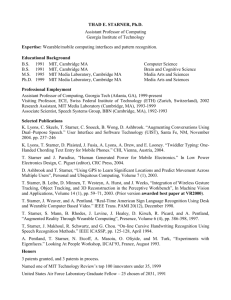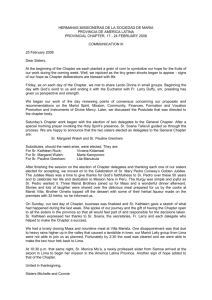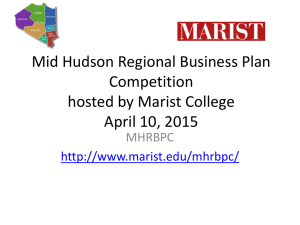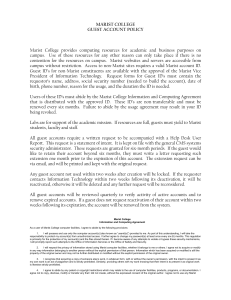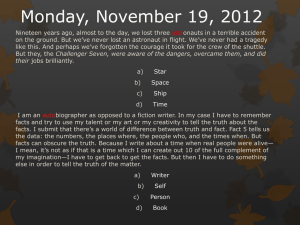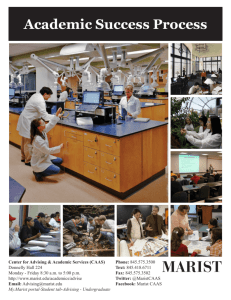The Cannavino Clarion - James A. Cannavino Library
advertisement
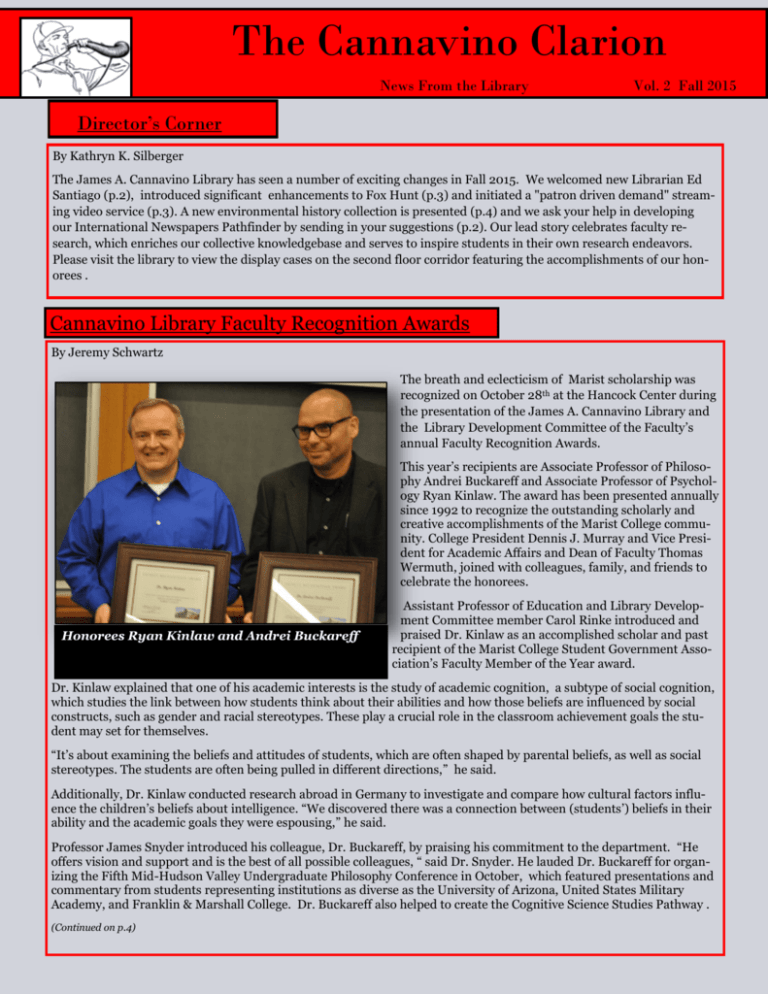
The Cannavino Clarion News From the Library Vol. 2 Fall 2015 Director’s Corner By Kathryn K. Silberger The James A. Cannavino Library has seen a number of exciting changes in Fall 2015. We welcomed new Librarian Ed Santiago (p.2), introduced significant enhancements to Fox Hunt (p.3) and initiated a "patron driven demand" streaming video service (p.3). A new environmental history collection is presented (p.4) and we ask your help in developing our International Newspapers Pathfinder by sending in your suggestions (p.2). Our lead story celebrates faculty research, which enriches our collective knowledgebase and serves to inspire students in their own research endeavors. Please visit the library to view the display cases on the second floor corridor featuring the accomplishments of our honorees . Cannavino Library Faculty Recognition Awards By Jeremy Schwartz The breath and eclecticism of Marist scholarship was recognized on October 28th at the Hancock Center during the presentation of the James A. Cannavino Library and the Library Development Committee of the Faculty’s annual Faculty Recognition Awards. This year’s recipients are Associate Professor of Philosophy Andrei Buckareff and Associate Professor of Psychology Ryan Kinlaw. The award has been presented annually since 1992 to recognize the outstanding scholarly and creative accomplishments of the Marist College community. College President Dennis J. Murray and Vice President for Academic Affairs and Dean of Faculty Thomas Wermuth, joined with colleagues, family, and friends to celebrate the honorees. Honorees Ryan Kinlaw and Andrei Buckareff Assistant Professor of Education and Library Development Committee member Carol Rinke introduced and praised Dr. Kinlaw as an accomplished scholar and past recipient of the Marist College Student Government Association’s Faculty Member of the Year award. Dr. Kinlaw explained that one of his academic interests is the study of academic cognition, a subtype of social cognition, which studies the link between how students think about their abilities and how those beliefs are influenced by social constructs, such as gender and racial stereotypes. These play a crucial role in the classroom achievement goals the student may set for themselves. “It’s about examining the beliefs and attitudes of students, which are often shaped by parental beliefs, as well as social stereotypes. The students are often being pulled in different directions,” he said. Additionally, Dr. Kinlaw conducted research abroad in Germany to investigate and compare how cultural factors influence the children’s beliefs about intelligence. “We discovered there was a connection between (students’) beliefs in their ability and the academic goals they were espousing,” he said. Professor James Snyder introduced his colleague, Dr. Buckareff, by praising his commitment to the department. “He offers vision and support and is the best of all possible colleagues, “ said Dr. Snyder. He lauded Dr. Buckareff for organizing the Fifth Mid-Hudson Valley Undergraduate Philosophy Conference in October, which featured presentations and commentary from students representing institutions as diverse as the University of Arizona, United States Military Academy, and Franklin & Marshall College. Dr. Buckareff also helped to create the Cognitive Science Studies Pathway . (Continued on p.4) Edgar Santiago-Assistant Librarian for Research Services New Assistant Librarian for Research Services The Cannavino Library gained a valuable new staff member in October, when Edgar Santiago was appointed as Assistant Librarian for Research Services. Santiago brings 20 years of experience as a research librarian, having worked in the publishing, utilities and not-for-profit industries. As a research analyst at Consumer Reports, Santiago conducted business research, with a focus on industry, market, and consumer trends. His research led to the preparation of in-depth market reports, analyzing information from multiple sources and interpreting quantitative and qualitative data, while drawing out key themes and insights. The expertise Santiago gained at Consumer Reports will be of valuable assistance to students studying business administration, marketing, and public relations, among other disciplines. Edgar Santiago Santiago is an engaging and knowledgeable presence at the Cannavino Library Reference Desk and looks forward to forging productive working relationships with faculty through classroom bibliographic instruction and developing course pathfinders. “My experience so far has been wonderful; I love interacting with the students, while teaching them how to do research. It’s great to see how focused they are and how grateful they are for our assistance.” International Newspapers Pathfinder Faculty Input Requested Marist College is a thriving and diverse multicultural community, with 300 international students from 49 countries represented on the Poughkeepsie campus. What’s more, many domestically born students choose to spend a portion of their college years studying abroad. The Modern Languages and Cultures Department offers courses in seven languages, while the Weiss Language Center provides a panoply of services and events to promote extracurricular language learning. With this in mind, Marta Cwik and Elizabeth Clarke, Library liaisons to the Modern Languages and Cultures Department, have created the International Newspaper The new International Newspapers Pathfinder is now up on the Pathfinder. Currently there are English and foreign language newspaper websites as well as Cannavino Library website access via the Library databases. The pathfinder is accessible from the James A. Cannavino Library website by clicking on course pathfinders and selecting special topics from the top tool bar or by going to http:// libguides.marist.edu/internationalnews. The Library asks faculty, staff, and students to contribute suggested newspaper titles to further enhance this new tool. Input is welcomed and appreciated; please send any suggestions to Elizabeth.Clarke2@marist.edu or Marta.Cwik@marist.edu. 2 Fox Hunt Interface Upgrades Research Efficiency Improvements By Katy Silberger Fox Hunt underwent an upgrade this summer resulting in several enhancements. The Fox Hunt search still begins with a simple, Google-like search box on the Library homepage, but the results display is now divided into three columns. The enhancements are seen in the new right hand column. This new design saves the searcher time by displaying dynamic information about the document currently highlighted. By moving the cursor over one record after another, the searcher can read a series of summaries and abstracts without ever having to open a separate tab or document. In the case of a book, the table of contents and links to book reviews are also provided. Also in the right hand column are buttons for citing and emailing. The Email button will send a link to the full text article. The Cite button allows the user to choose a citation format and then displays an easily copied citation that can be pasted into a document . The limiters are still available in the left hand column. Searchers can limit results to peer reviewed content, to various format types, by discipline, and they can specify a publication date range with the date slider. The book/ eBook format limiter has been enhanced. When it is checked additional limiters such as “author”, “genre”, “region”, and “time period” become available. Fox Hunt now has a responsive design web architecture which means that it will adapt to all sizes of screens, from desktop to smartphone. The Search box now features predictive text. Midway down the search results page are links to possible related searches. Finally the searching algorithms were enhanced to present the most relevant documents at the top of the results display. The new Fox Hunt interface facilitates efficient citation formation Collection Development News Kanopy On-Demand Streaming Media By Judy Diffenderfer After a successful campus trial in the spring, the Cannavino Library subscribed to Kanopy's streaming media patron driven demand service this fall. In order to pay for the service, we cancelled all but one of our subscriptions to the Alexander Street Press media databases; we have retained our subscription to the Filmmakers Library Online. Kanopy currently has over 26,000 films in their database and fifty or more new titles are added each month. The videos come from leading producers such as Criterion, PBS, California Newsreel, Kino Lorber, and First Run Features. During our trial, several faculty members commented on the currency and breadth of the collection. To assist in using the service, please note: * The database can be browsed by subject area or keyword. * Each subject page and each individual film have a permanent URL that can be used for direct linking from course pathfinder or your iLearn site. * By establishing an account, you can create clips, playlists, and a watch list for future viewing. * The homepage features a listing of new videos added that month, as well as other special listings. As of November 30, over 70 films have been viewed with seven films being viewed four or more times. Films triggered for purchase of a one year license include Hair: Let the Sun Shine In; Art & Copy; Thoughtful Reading; John Bowlby: Attachment Theory Across Generations; and Unseen Enemies. 3 ARCHIVES AND SPECIAL COLLECTIONS NEWS New Environmental History Collection Available to Researchers began teaching Economics at Wisconsin-La By John Ansley Crosse. While The Marist Archives and Special Collections recently acat La Crosse, he quired an important environmental history collection that helped found documents the early years of the Clearwater organization. the Great River The Fred Starner Collection is a collection comprised Traditional largely of administrative files concerning the Hudson Riv- Music and er Sloop Clearwater, Inc., but it also contains newspaper Crafts Festival, clipping scrapbooks, posters, flyers, a pamphlet, a prowhich contingram, a photograph, and handwritten poems and lyrics to ued for almost both traditional and original folk songs. Also included in ten years. He the collection are Starner’s notes on Clearwater, which he moved to Calibegan to compile for a book tentatively titled The Singers fornia to teach and the Boat. economics at multiple com"Banjo Fred" Starner was born George Frederick Starner munity colleges to James and Charlotte Starner in Toledo, Ohio in 1937. while continuHe attended Oberlin College, where he completed a Bacheing to perform lor’s degree in Economics. While at Oberlin, he was first and write songs drawn to folk music after attending a Pete Seeger concert, in 1987. an experience which inspired Starner to learn five-string banjo, and later twelve-string guitar. Later, he received a Starner was also fascinated by hobo culture, an interest Master’s from the University of Michigan and a Ph.D. in that apparently began when he recalled his mother giving Economics from Ohio State University. He became a Pro- money and meals to the hobos that passed by their house. fessor of Economics at Drew University in New Jersey, but A significant amount of effort towards the end of his life was dismissed due to his political activism. He was heavily was focused on producing the documentary film “That’s involved in the Hudson River Sloop Clearwater, a project the Ticket Road Hog: The Hobo’s Song,” released in 2009, conceived by Seeger in which a ship would be constructed with material drawn from his compilation of the songs, through community funding and sponsor environmental poetry, and personal stories that he collected from and folk education programs. He helped with the initial firsthand conversations. fundraising by putting on a concert series. Starner was on He died of complications of pneumonia and chronic lung the ship’s maiden voyage in 1969 from Maine to New York disease in Los Angeles on Sunday, October 25, 2009 at age as a crew member with his wife Barbara, whom he married 72. in 1962, serving as the cook. In all, he was involved with the organization from 1968-1974, even serving on the All interested researchers can see the collection in person Board of Directors for three years in the 1970s. by visiting the Archives and Special Collections in room 134 of the Library or by going on-line: http:// Starner was involved in a number of other projects as well. library.marist.edu/archives/FSC/FSC.xml. He worked on a ten-part PBS documentary series entitled The Oleanna Trail in 1972 about folk music. In 1974, he Faculty Recognition Awards Continued from page 1) In his remarks, Dr. Buckareff dispensed with popular stereotypes and misconceptions regarding the work of philosophers. “I am neither prone to engage in sustained contemplation of my navel under the shade of a tree or nor do I have any thoughts on the ‘meaning of life’ that resulted from long hours standing on my head.” Instead, he cited the 1962 essay, “Philosophy and the Scientific Image of Man, “ by Wilfrid Sellers, as key influence in his research on the metaphysics of the mind and intentional agency, specifically the reconciliation of what Sellers termed the “manifest image” man, as in the creation myth, of being distinct from the rest of the world and the “scientific image” that is delivered through the methods and standards of scientific inquiry. “The scientific image forces us to revise the manifest image. Such revision is not elimination. We often forget this when we encounter new discoveries that threaten our conception of ourselves. But fear is not the proper reaction. Rather, we should be excited by the prospect of gaining a clearer picture of ourselves.”
